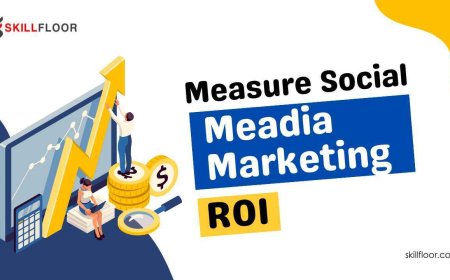B2B Digital Marketing: Strategies for Targeting Businesses
Discover effective B2B digital marketing strategies to reach and engage businesses. Learn how to target your audience, boost ROI, and competitive B2B landscape.

B2B digital marketing, short for Business-to-Business digital marketing, is a dynamic and evolving field that plays a crucial role in modern business strategies. Unlike B2C (Business-to-Consumer) marketing, which targets individual consumers, B2B marketing focuses on reaching and engaging with other businesses. In today's digital landscape, where online presence and digital interactions are paramount, understanding and implementing effective B2B digital marketing strategies are essential for business growth and success. In this comprehensive guide, we will explore the strategies and tactics that can help businesses effectively target other businesses in the digital space. From understanding the unique characteristics of the B2B audience to leveraging content marketing, SEO, social media, email campaigns, and account-based marketing (ABM),
B2B digital marketing
B2B digital marketing, or business-to-business digital marketing, refers to the strategies and techniques used by companies to promote their products or services to other businesses in the online landscape. It involves tailored approaches, content, and channels aimed at reaching and engaging with key decision-makers and influencers within the B2B sector. B2B digital marketing leverages various online platforms, including websites, social media, email, and search engines, to drive lead generation, establish industry authority, and foster valuable business relationships.
Understanding the B2B Audience
In B2B digital marketing, a crucial starting point is gaining a deep understanding of the B2B audience. This involves identifying the distinct characteristics that define B2B buyers, recognizing the pivotal roles played by decision makers and influencers within organizations, and meticulously dissecting the intricate B2B purchase journey.
B2B buyers are a unique segment with specific needs and priorities, distinct from typical consumer markets. Decision-makers and influencers often collaborate in making purchase decisions, each contributing their insights and requirements. Understanding this dynamic is pivotal for crafting effective marketing strategies. Additionally, delving into the B2B purchase journey, from problem recognition to evaluation and final decision, provides valuable insights into where and how marketing efforts can make the most impact. In this complex landscape, comprehending the B2B audience is the cornerstone upon which successful digital marketing strategies are built.
Content Marketing for B2B
In B2B digital marketing, content is king. Creating informative and educational content is the foundation of attracting and engaging business audiences. This content can take various forms, such as blog posts, articles, videos, and infographics. Leveraging case studies and whitepapers showcases real-world success stories and in-depth research, instilling confidence in potential clients. Additionally, incorporating thought leadership and industry insights establishes your company as an authority in the field, attracting businesses seeking expertise and solutions. In B2B marketing, content isn't just about information; it's about building trust and credibility within your industry.
SEO and B2B Digital Marketing
-
Significance of SEO in B2B marketing
-
Conducting thorough keyword research for B2B audiences
-
On-page SEO strategies tailored to B2B content
-
Off-page SEO techniques for building backlinks and authority
-
The importance of local SEO for targeting businesses in specific locations
-
Utilizing schema markup for enhanced search visibility
-
Monitoring and optimizing SEO performance with analytics tools
-
Staying updated with search engine algorithm changes and SEO best practices for B2B marketing success.
Social Media in B2B Marketing
In the world of B2B marketing, social media has emerged as a powerful tool for connecting with businesses, building brand awareness, and nurturing valuable relationships. Here's a closer look at how to leverage social media effectively in your B2B marketing strategy:
Selecting the appropriate social media platforms is a critical first step. Not all platforms are created equal when it comes to B2B marketing. LinkedIn, Twitter, and, to some extent, Facebook are popular choices for reaching a professional audience. Understanding where your target audience spends their time is essential to focus your efforts effectively.
professionalism is key. Your social media profiles should reflect your brand's values and expertise. Use high-quality visuals and content that demonstrate your industry knowledge. Consistency in branding and messaging across all social media channels helps establish a trustworthy and recognizable presence.
LinkedIn, often referred to as the "professional network," is a goldmine for B2B connections. Create a compelling LinkedIn company page, optimize employee profiles, and actively engage in industry groups and discussions. Sharing thought leadership content, industry insights, and success stories can help you forge meaningful connections and position your brand as an industry leader.
Incorporating social media into your B2B marketing strategy allows you to engage with businesses on a personal level, showcase your expertise, and establish trust, all of which are essential elements in building successful B2B relationships.
Email Marketing Strategies
In B2B digital marketing, email marketing stands as a powerful tool for connecting with potential clients and nurturing existing relationships. To harness its potential, businesses must begin by meticulously building a targeted B2B email list, ensuring that their communications reach the right recipients. Crafting personalized email campaigns is the next crucial step, tailoring content to the unique needs and interests of each recipient. Finally, success in email marketing hinges on diligent measurement and analysis, allowing businesses to refine their strategies based on performance metrics and engagement data, ultimately driving better outcomes and fostering valuable client connections.
Data Analytics and B2B Marketing
In the world of B2B marketing, data is the compass guiding strategic decisions. Understanding the pivotal role of data in B2B marketing decisions is the first step. Analytics tools offer the means to track the performance of B2B campaigns with precision, providing insights that inform adjustments and optimizations. By embracing data-driven adjustments, B2B marketers can adapt strategies in real-time, ensuring they stay on course to achieve their objectives and maximize their marketing investments. In this section, we explore how data analytics empowers B2B marketers to navigate the complex landscape of business-to-business marketing effectively.
Building Trust and Relationships
-
Content Authority: Establish credibility by creating high-quality, authoritative content that demonstrates your industry expertise.
-
Transparency: Be open and honest in your communications. Transparency builds trust with potential B2B partners.
-
Consistency: Maintain a consistent online presence through regular posting, updating, and engagement with your audience.
-
Engagement: Actively engage with your B2B audience through comments, responses, and discussions on social media and other platforms.
-
Personalization: Tailor your interactions and content to the specific needs and challenges of individual businesses.
-
Case Studies and Testimonials: Showcase successful collaborations with other businesses through case studies and client testimonials.
-
Customer Support: Provide excellent customer support and assistance to address any inquiries or concerns promptly.
-
Networking: Attend industry events and conferences to meet potential B2B partners in person and establish face-to-face relationships.
-
Long-Term Focus: Shift the focus from short-term gains to building long-term, mutually beneficial relationships with B2B clients.
-
Partnership Agreements: Create clear and mutually beneficial partnership agreements that outline roles, responsibilities, and expectations.
These strategies are essential for fostering trust and building lasting relationships with B2B partners in the digital marketing landscape.
Measuring ROI in B2B Digital Marketing
Measuring the return on investment (ROI) is a critical aspect of any B2B digital marketing strategy. It begins with defining key performance indicators (KPIs) that align with your business objectives. These KPIs may include website traffic, lead generation, conversion rates, and more. Once you've established your KPIs, calculating ROI involves assessing the costs associated with your digital marketing efforts and comparing them to the revenue generated.
An effective ROI analysis provides insights into which strategies are delivering the best results and where adjustments are needed. It enables you to allocate resources more efficiently, ensuring that your B2B digital marketing efforts are not only targeted but also delivering a tangible return on your investment.
B2B digital marketing is a dynamic and ever-evolving field that requires a strategic approach to reach and engage business clients effectively. We've explored key strategies, such as content marketing, SEO, social media engagement, and email marketing, that can help businesses create a strong digital presence. As the landscape of B2B marketing continues to shift in the digital age, adapting to these strategies is crucial for success. Embracing data-driven decision-making, fostering trust and lasting relationships, and keeping a pulse on industry trends are all essential components of a successful B2B digital marketing strategy. It's our hope that this guide encourages businesses to harness the power of digital marketing in their B2B efforts, ultimately leading to increased growth and profitability in an increasingly digital business world.






























































